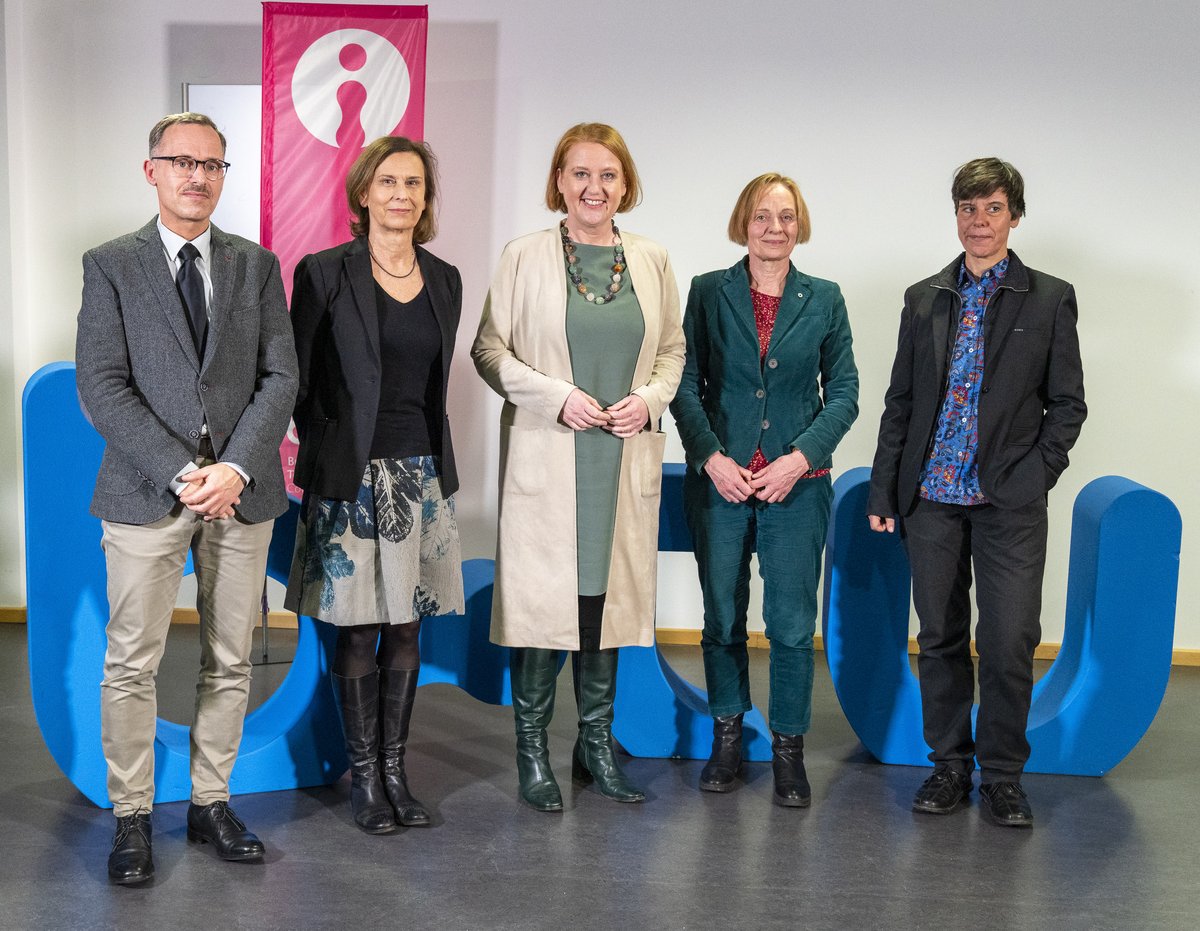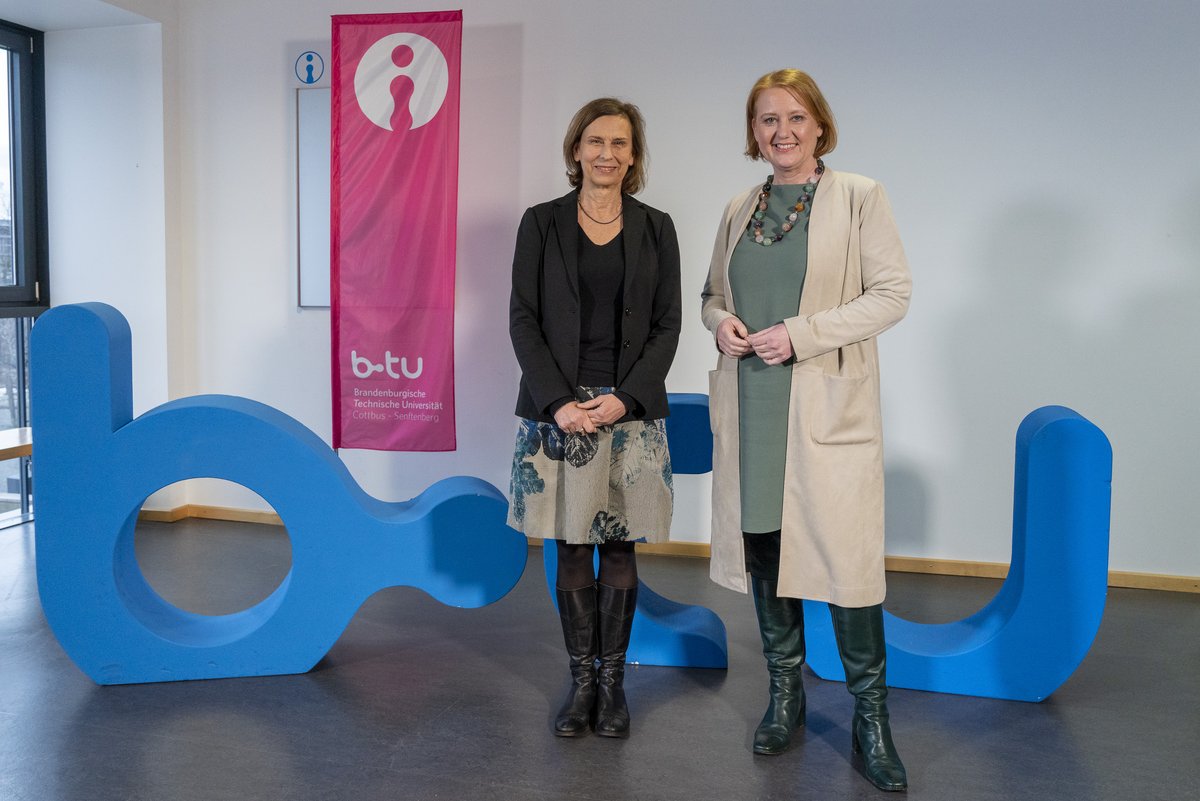Family Minister Paus learns about democracy education at BTU
How can right-wing extremist structures be weakened and democratic commitment strengthened? This was the key question on the ministerial visit program and so Federal Minister Lisa Paus - accompanied by Petra Budke, education policy spokesperson for Bündnis 90/Die Grünen in the Brandenburg state parliament - learned about democracy-promoting measures and initiatives at BTU.
"We at BTU, with more than 40 percent international students and many academics from all over the world, are very happy about our diversity and cosmopolitanism. We are very committed to tolerance, democratic values and countering right-wing extremism both inside and outside the university, e.g. in the 'Cottbus is colorful' initiative, at Cottbus Open, with our action plan against extreme right-wing influence, through democracy education as part of the new study programme for primary school teachers, but also in research," said University President Prof. Dr. Gesine Grande. She would like to see civil society engagement in the region receive more attention in the media.
Federal Minister for Family Affairs Lisa Paus: "Thank you for the warm welcome and the exciting insight into research and teaching on democracy and pedagogy at BTU Cottbus-Senftenberg, the exchange on hate speech, loneliness and the special challenges at the university. It is good to know that your motto 'Research for a better world of tomorrow' is being brought to life and implemented with such commitment."
"Education for democracy is the central task of our primary school teaching degree course, which was introduced in October. If democracy education is to take place in schools, teaching staff must be trained accordingly," explained BTU President Prof. Grande. Democracy education is more than just a subject in the classroom, it is an active participatory practice. And so democracy education at BTU is seen as a cross-cutting topic in the entire course of study and is supported by specialist days and expert discussions. The theoretical studies are accompanied by integrative practical weeks, whereby the holistic view is focused on the educational processes of the child. BTU was recently awarded the University Pearl of the Year 2023 by the Stifterverband für die deutsche Wissenschaft for its practice-integrated primary school teaching study programme.
Prof. Dr. Heike Radvan from the "Methods and Theories of Social Work with a Focus on Community Work and the Prevention of Right-Wing Extremism" chair also emphasized the importance of training in raising awareness in the fight against right-wing extremism and xenophobia. This is why specialist days, for example on racism-critical training and democracy education, are part of the teacher training course. In the same way, BTU also offers internal training for employees and she and her team have drawn up an action plan against right-wing extremism on behalf of the executive committee to protect the university from the influence of anti-democratic and extreme right-wing forces. As one of the first measures, this action plan provides for the establishment of a monitoring office for incidents of discrimination and right-wing violence; in addition, administration, teaching and studies are to be sensitized to forms of discrimination and right-wing extremist symbols.
Prof. Dr. Ludwig Bilz, Chair of Educational Psychology in Health Professions, presented his project "Hatespeech as a school problem" to Family Minister Paus as one of the current research projects at BTU. Prof. Bilz said that derogatory statements against certain groups of people, for example due to their origin, gender or religion, can be observed in all areas of society. Together with his team and in cooperation with colleagues from the University of Potsdam and the Bern University of Teacher Education, he investigated how widespread this problem is in schools between 2019 and 2023. The researchers surveyed 3,600 pupils and 486 teachers in Germany and Switzerland. The results showed that 67% of pupils witness hate speech at school each year. The current follow-up project focuses on school-related interventions against hate speech. With funding from the Federal Ministry for Family Affairs, Senior Citizens, Women and Youth, the team is currently compiling a catalog of all internationally available programs that can be used in schools to combat hate speech. These programs are being analyzed on the basis of scientific and practical quality criteria and recommendations for their use in schools are being formulated. A specialist conference planned for the end of the project at the end of 2024 will offer teachers the opportunity to obtain information, receive training and exchange experiences.
About democracy education as part of the training of new teachers and the promotion of democracy in teacher training courses at BTU
Education for democracy is considered a central task of school work. In order to be able to fulfill this, teachers must be trained accordingly. The BTU concept is based on the idea that democracy education is more than just a subject in the classroom, but a lived participatory practice. In order to provide teachers with skills that enable them as teachers to implement democracy education in schools, appropriate settings have been implemented as part of the primary school teaching degree study programme.
Compulsory discussions of recent German history, including the National Socialist era and the SED dictatorship, are combined with factual knowledge and, in particular, with learning about relevant institutions and opportunities for participation. Students should thus get to know and understand their future field of work and its integration into the network of various democratic institutions. In addition, democracy education is seen as a cross-cutting topic throughout the course and is supported by specialist days and expert discussions. Extracurricular places of learning, such as the Human Rights Center, the local history museum in Dissen or the Neue Bühne Senftenberg, provide prospective teachers with new perspectives and a practical reference for a critical examination of history. They offer opportunities to meet contemporary witnesses and experience democracy. An approach that can be transferred from teacher training to later work with pupils on the one hand and, on the other, enables the development of the necessary teacher personality.


